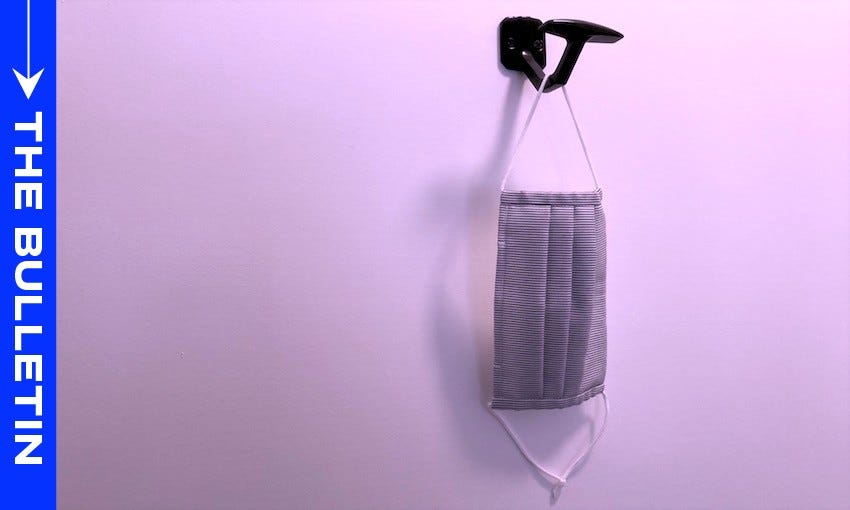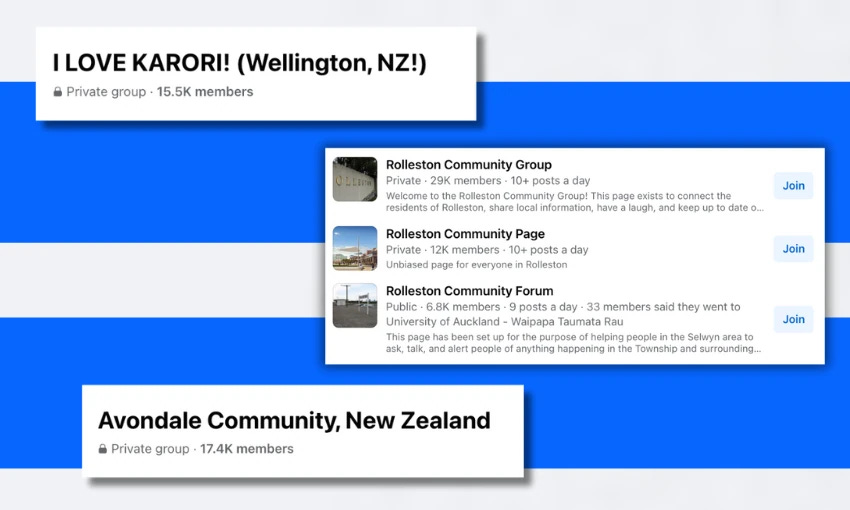We’ve reached the shortest day, but winter illnesses haven’t slowed down
Covid may have peaked (again), but it's not the only sickness worrying officials.
Mōrena, and welcome to The Bulletin for Friday, June 21.
In today’s edition: A step closer to the funding of new cancer drugs, fresh questions about embattled MP Darleen Tana, and most homes in Northland have power back after a widespread blackout. But first, warnings over a rise in illnesses.
Covid peaks (again), but other illnesses are still on the rise
It’s the shortest day of the year, meaning it’s also the midpoint of winter. Things can, one would hope, only get better from here – The Spinoff’s Gabi Lardies has you covered with tips for celebrating this milestone. But with colder months means the annual rush of illnesses, some more serious than others. We’ve talked recently about the resurgence of Covid-19 and the ongoing concerns of complacency around vaccinations. That isn’t going anywhere, though as the Herald’s Jamie Morton reported this week, the latest wave appears to have nearly peaked. And that peak is pretty high – Wellington Hospital was even forced to open its first dedicated Covid ward since 2021. It’s not just Covid making people sick this winter and making headlines. As Stuff’s Hannah Martin reports, health officials are warning of a rise in other illnesses, including RSV, influenza and whooping cough.
Whooping cough cases already outnumber 2023
It’s been about six years since the last serious outbreak of whooping cough, which unfortunately means we’re overdue for another. The first five months of the year have seen more cases of the illness than all of 2023. Health NZ warned medical experts to be alert, reported NZ Doctor at the end of last month, “asking healthcare providers to consider [whooping cough] in their differential diagnosis for patients presenting with respiratory symptoms and to encourage vaccination”. During last year’s cluster of cases, there were concerns about low immunisation rates among pregnant women, as this Otago University research explained. It was one of three factors, including “long-standing poor timeliness” for children being vaccinated, the researchers saw as a potential cause for a rise in case numbers and deaths.
We’re not alone in facing an unseasonably high number of cases. In Australia, reported the ABC, New South Wales had its highest number of whooping cough cases in eight years. The UK and America are also experiencing surges, with the Washington Post saying it could be an unfortunate side effect of the Covid pandemic as “children may have missed vaccination appointments” due to stay-at-home orders.
A winter fever
Another illness causing concern among healthcare providers at the moment is rheumatic fever, which is more prevalent in the colder months because it’s typically caused by untreated cases of strep throat. NZ Doctor’s Alan Perrott (paywalled) reported yesterday that Auckland was experiencing its largest wave of rheumatic fever cases in six years, with 28 reported in the first quarter. It may sound like a small number, but rheumatic fever is serious. This Herald report from Nicholas Jones earlier in the year explained that it can inflame and damage heart valves, “resulting in disability and early death – often decades later”. About 140 New Zealanders die from rheumatic heart disease every year. As Perrott wrote, almost 70% of this year’s rheumatic fever cases have occurred in South Auckland and all but six of the infections involve Pacific peoples.
In 2019, Whakaata Māori’s Aaron Ryan noted that Pacific children were 80 times more likely to contract the fever than other groups, in part because of overcrowding and poor housing conditions. A similar surge in cases last year prompted calls for a more equitable approach to the illness, reported The Hui. "If we had a whole lot of Pākehā children in Remuera dying of an infectious disease we would see huge political campaigns and resourcing into it," said Auckland University’s Dr Anneka Anderson at the time. The Labour government launched a five-year “roadmap” aiming to manage rheumatic fever, with the former associate health minister Barbara Edmonds calling it an “entirely preventable disease”. Since then, the coalition government has dismantled the Māori Health Authority, though the roadmap has survived, according to Health NZ’s website. There’s been little acknowledgement since, but the current minister Shane Reti mentioned rheumatic fever when defending his government’s less centralised approach to healthcare, reported the Northern Advocate in March.
Health workforce in the spotlight
Everything we’ve talked about above contributes to an unpleasant cocktail that has the health workforce on edge. And the chilly temperatures aren’t the only reported freeze. Though Health NZ has since denied it, RNZ reported yesterday morning that budget cuts at Health NZ had led to a hiring freeze on new graduates, with the nurses’ union expressing concern it would mean health workers couldn’t find a job. "We need more of them,” said union boss Paul Goulter. “We're using internationally qualified nurses, immigrant nurses at the moment, but that does not and cannot substitute for the need to train our own and give them good jobs.” Health NZ has hit back, rejecting any statements claiming there was a freeze on new recruits. “The graduate process is still underway, applicants have expressed their preferences and matching is happening across NZ," Health NZ chief nurse Nadine Gray said, as Newshub reported here.
Join The Spinoff Members
“The Spinoff has given me my faith in good journalism back.” Anja, Spinoff member since 2020. If, like Anja, you value our work and want to support us, please consider becoming a member today. Already a member? Ka nui te mihi, your support means the world to us.
$600m Pharmac boost in effort to fund new cancer drugs – report
Pharmac is due for a $600m budget boost as the government works to keep its promise of funding 13 new cancer drugs, The Post’s Rachel Thomas has reported this morning. Given Pharmac’s independence, the 40% increase in funding could mean the drugs purchased differ from the treatments campaigned on by National. According to the report, the proposal has yet to be signed off by cabinet but this could come next week. The extra money would allow Pharmac to work its way down its drug funding wish list, reported Thomas, until it reached cancer drugs that are “either the same or equivalent” to those named in the campaign. In a statement this morning, Patient Voice Aotearoa welcomed the news, saying the budget boost would “put a significant dent” in Pharmac’s medicines waitlist.
The minister responsible for Pharmac, David Seymour, told RNZ’s Checkpoint yesterday that the government was seeking a “disciplined and thoughtful approach” that would result in the best possible outcomes for patients. "There's probably more politics in this than there needs to be so far."
Questions over Northland power outage as blackouts continue
Most homes in Northland have had power restored, but hot water remains off, reports the Herald’s Raphael Franks. It comes after after a transmission tower collapsed yesterday morning, cutting off power to much of the region. Blackouts are expected to continue throughout the day. Questions remain over what caused the tower to fall, as it was undergoing maintenance at the time it collapsed. The emergency management minister Mark Mitchell said it raised concerns over the resilience of Northland’s infrastructure, while Northland MP Grant McCallum said it was the “the last thing” those in Northland needed after severe weather cut transport links in 2023.
What kind of homes do we actually want?
Is the Kiwi dream to own a “McMansion”, a “shoebox” or something else entirely? Bernard talks with The Urban Advisory’s MD Greer O’Donnell about a major new survey of what type of homes we actually want. She says it may not be the quarter acre “pavlova paradise” still assumed by many voters and politicians when they’re deciding on what should be be built and where.
If you’d like to take part in The Urban Advisory’s housing survey, click here.
Anapela Polataivao on stepping up to the work
"It’s about going into the unknown willingly, and troubleshooting along the way!"
In the first story of Art Work, we speak with award winning director and actor, Anapela Polataivao ONZM. Her theatre directing work includes Wild Dogs Under My Skirt, Savage Coloniser, Things That Matter and the upcoming theatrical adaptation of Red White and Brass.
In this story, Polataivao shares what it means to commit to the work. Read it here.
Click and Collect
Stuff’s Steve Kilgallon has reported on fresh questions about the behaviour of suspended Green MP Darleen Tana, who has been off work since March.
Invercargill’s mayor Nobby Clark will be asked to resign today following a series of conduct complaints, including allegations he made offensive remarks at a recent awards dinner. Back in March, I reported for The Spinoff that some councillors were deeply unhappy with Clark’s appearance on comedy programme New Zealand Today in which he repeatedly said a slur.
It was perhaps the best possible outcome, with the economy confirmed to have grown by 0.2% in the first quarter of the year.
This in-depth report by RNZ’s Guyon Espiner into “pitiful” alcohol levy increases slipped me by yesterday morning, so I’m sharing it now in case anyone else missed it. It’s an interesting read.
The government’s touting a record investment in public transport as it readies to roll out a nationwide ticketing system, starting in Auckland later this year.
The prolific Hollywood actor Donald Sutherland has died at the age of 88. On Twitter, the actor’s son Kiefer said his father was “never daunted by a role, good, bad or ugly. He loved what he did and did what he loved, and one can never ask for more than that. A life well lived”.
Huge news: The Spinoff is doing live events and you’re invited
Our popular columns, podcasts, pop culture takes and politics are hitting the road. The Spinoff Live is a 10-event series across Auckland and Wellington, featuring live chats between our writers and special guests. Tickets are on sale now and going fast. Get yours today.
A tribute to the best and worst of community Facebook groups. Alex Casey and Tara Ward compile a brief history of New Zealanders featuring on Below Deck. Madeleine Chapman has some ideas about how not to be an arsehole when you don't like someone's parking. Gabi Lardies dives into the history of New Zealand's one-term governments. Alex Casey speaks to the founder of the Museum of Archeology Ōtautahi. Hera Lindsay Bird advises a reader whose partner refuses to eat any veges.
A shout out to Shanti Mathias
Finally this morning, a massive congratulations to The Spinoff’s Shanti Mathias who took home the inaugural Emerging Journalist prize at the Science Journalism Awards earlier in the week for her story ‘Staring down the ‘silent epidemic’ of myopia in children’.
“The judges were impressed with how ‘on-the-scene’ the reporting was, including the voices of school students and the team running the vision-checking bus,” said the team at the Science Media Centre. An incredibly well deserved honour!
That’s it for The Bulletin this week, thanks for reading. I’ll be back on Monday.
Let me know in the comments, or get in touch with me at thebulletin@thespinoff.co.nz, if you have any feedback on today’s issue or anything in the news.
If you liked what you read today, share The Bulletin with friends, family and colleagues.




















The shortest day is the first day of winter, not the middle of winter!